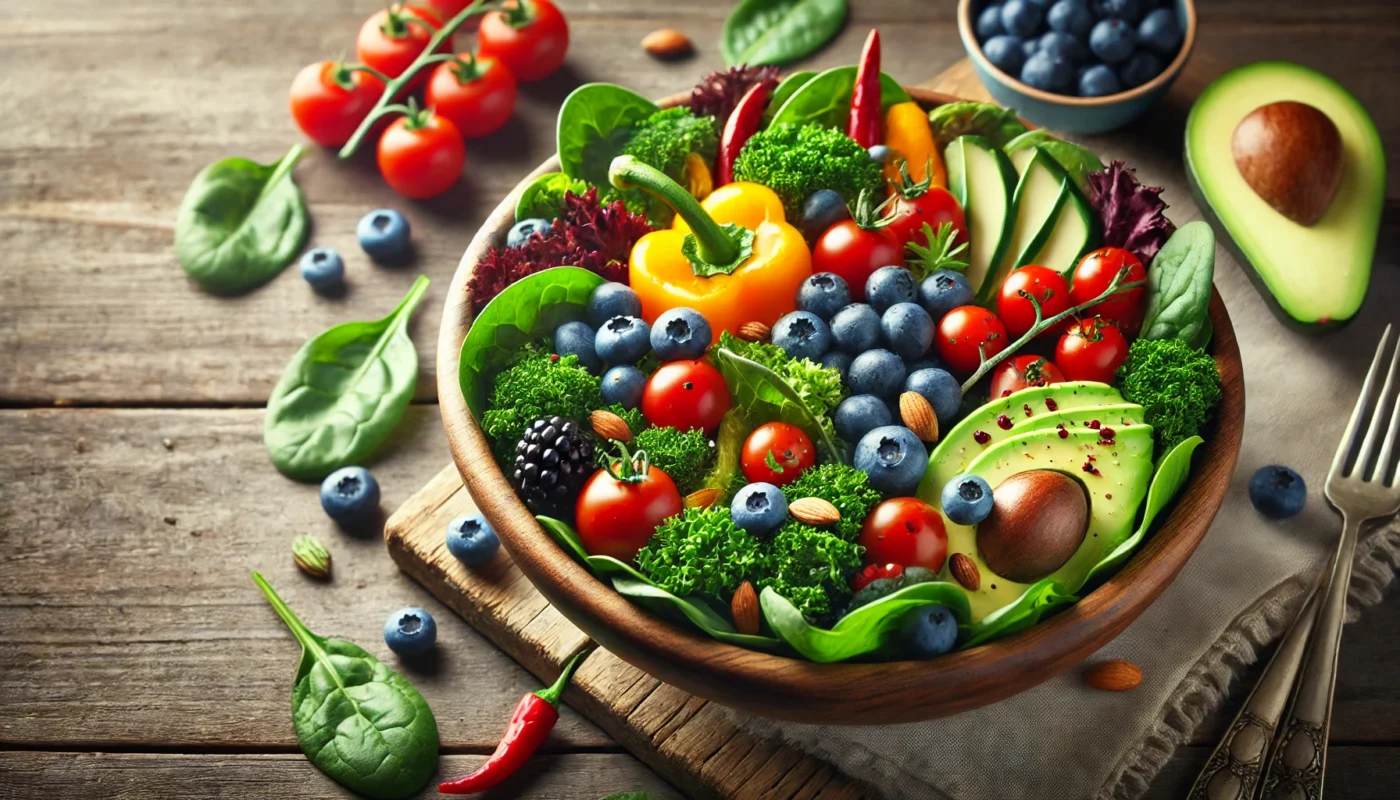Inflammation is a common concern. It’s a natural response of the body to injury or illness. But when it becomes chronic, it can lead to serious health issues.
Enter antioxidants. These compounds are often touted as a solution to combat inflammation. But do they really work?
This article aims to answer that question. We’ll delve into the science behind antioxidants and inflammation. We’ll explore how these compounds function in the body and their potential benefits.
We’ll also look at dietary sources of antioxidants. Fruits, vegetables, nuts, and seeds are all rich in these compounds. Blueberries, in particular, are often highlighted for their anti-inflammatory properties.
But it’s not just about what you eat. The body also produces its own antioxidants. Understanding the balance between these internal and external sources is key.
We’ll also examine the research. What does the science say about antioxidants and inflammation? Are they really the magic bullet they’re often made out to be?
The role of antioxidants in chronic diseases will also be discussed. Conditions like arthritis, heart disease, and even cancer have been linked to inflammation. Can antioxidants help manage these conditions?
Supplementation is another important topic. While getting antioxidants from food is ideal, some people turn to supplements. But are they as effective?
Finally, we’ll provide practical tips. Whether you’re a fitness enthusiast, a health enthusiast, or a medical patient, you’ll find strategies to incorporate antioxidants into your lifestyle.
This article is your comprehensive guide to understanding antioxidants and inflammation. It’s backed by scientific research and practical advice.
So, do antioxidants really combat inflammation effectively? Let’s find out.
You May Also Like: Natural NSAIDs: Benefits and Side Effects
Understanding Inflammation and Antioxidants
To grasp the link between antioxidants and inflammation, it’s crucial to start with the basics. Inflammation is the body’s defensive response to harmful stimuli like pathogens, damaged cells, or irritants. While it’s vital for healing, prolonged inflammation can lead to disease.
Antioxidants, on the other hand, are compounds that prevent or slow damage to cells caused by free radicals. These free radicals are unstable molecules that the body produces in response to environmental and other pressures.
Understanding the interplay between oxidative stress and inflammation is key. Oxidative stress occurs when there’s an imbalance between free radical production and the body’s ability to counteract their harmful effects. This stress is a key player in the development of chronic inflammation.
Notably, zinc plays a crucial role in mitigating oxidative stress and modulating inflammatory responses. Discover how this essential mineral influences inflammatory pathways and supports cellular health.
What is Inflammation?
Inflammation is a complex biological response. It involves the immune system’s healing mechanisms at work.
When tissues are injured by bacteria, trauma, toxins, heat, or any other cause, the inflammation process is initiated. This process includes increased blood flow, immune cell activation, and chemical releases to the damaged area.
Acute inflammation is a short-term response with localized effects. It helps the body heal itself. For example, when you cut yourself, the area becomes red and swollen, a classic sign of inflammation.
Chronic inflammation, however, persists over time and can damage the body. Conditions like arthritis, heart disease, and even some cancers have been linked to chronic inflammation.
Understanding inflammation’s role in the body helps us appreciate how pivotal managing it effectively can be in maintaining health and preventing disease.
The Role of Oxidative Stress in Inflammation
Oxidative stress and inflammation are closely linked, often perpetuating each other. Free radicals, reactive oxygen species (ROS), are molecules generated by the body’s normal metabolic processes.
In small amounts, ROS are beneficial, involved in cell signaling and homeostasis. However, when their production exceeds the body’s antioxidant defenses, oxidative stress occurs.
Oxidative stress damages cells, proteins, and DNA. This damage can lead to chronic inflammation and contribute to the aging process and diseases like heart disease, diabetes, and cancer.
The chronic production of free radicals adds fuel to the inflammatory fire. It creates a cycle where oxidative stress leads to inflammation, and inflammation in turn produces more free radicals.
Breaking this cycle is essential, and this is where antioxidants come into play.
Defining Antioxidants and Their Function
Antioxidants are substances that can prevent or slow cell damage. They do this by neutralizing free radicals, thus preventing oxidative stress and inflammation.
These compounds are diverse, consisting of vitamins, minerals, and phytochemicals. They can be found in both plant and animal foods.
Some common antioxidants include:
- Vitamin C: Found in citrus fruits like oranges and lemons.
- Vitamin E: Present in nuts and seeds like almonds and sunflower seeds.
- Flavonoids: Found in a wide variety of fruits and vegetables, such as berries and green tea.
- Carotenoids: Present in carrots, pumpkins, and sweet potatoes.
Antioxidants can be endogenous (produced by the body) or exogenous (obtained from the diet). They play a pivotal role in the body’s defense against oxidative stress.
How Antioxidants May Reduce Inflammation
Antioxidants help reduce inflammation by neutralizing free radicals. This prevents oxidative damage to cells.
Their function doesn’t stop at scavenging free radicals. Antioxidants also boost the body’s defense systems and reduce inflammatory responses.
Here are a few ways antioxidants work to mitigate inflammation:
- Neutralizing free radicals: They react with free radicals to make them stable, preventing damage.
- Regulating inflammatory pathways: Antioxidants influence pathways that control inflammation.
- Reducing inflammation markers: Studies show antioxidants can lower markers of inflammation in the body.
In essence, antioxidants support the body’s natural capacity to maintain cellular health. They modulate immune responses and promote healing by minimizing oxidative stress-related inflammation.
Understanding this process sheds light on why increasing antioxidant intake can be beneficial in managing inflammation and improving overall health.

Antioxidants in the Diet: What to Know
Our diet is a primary source of antioxidants, which play a vital role in reducing inflammation. Various foods, notably fruits and vegetables, are rich in these vital compounds.
Incorporating a variety of antioxidant-rich foods is essential for maximizing health benefits. Each type of antioxidant contributes uniquely to reducing oxidative stress and inflammation.
Becoming familiar with the different types and sources of antioxidants can help in crafting a diet that supports overall health. Their presence in various food groups provides flexibility and variety, making it easier to maintain a balanced, health-enhancing diet.
Types of Dietary Antioxidants
Antioxidants come in many forms, each with distinct properties and benefits. Understanding these types can help tailor your dietary choices.
Some common categories of dietary antioxidants include:
- Vitamins: Such as vitamin C and vitamin E, essential for skin and immune health.
- Minerals: Like selenium and zinc, which are vital for metabolic functions.
- Flavonoids: Found in a variety of fruits, vegetables, and beverages. They support heart health.
- Carotenoids: Like beta-carotene and lycopene, which promote eye health and skin repair.
- Polyphenols: Present in teas, cocoa, and berries, known for protective effects against heart disease.
Each type of antioxidant can be derived from multiple dietary sources. This emphasizes the importance of consuming a diverse diet to cover all bases.
An informed approach to selecting foods rich in these antioxidants can effectively support the body’s fight against inflammation.
Antioxidant-Rich Foods and Inflammation
Eating a diet rich in antioxidants is a simple, effective way to combat inflammation. Various foods contain high levels of these valuable compounds.
A few potent antioxidant-rich foods to consider include:
- Berries: Such as blueberries, strawberries, and blackberries, are packed with flavonoids and vitamin C.
- Dark chocolate: High in polyphenols, supports cardiovascular health.
- Chia seeds: Rich in omega-3 fatty acids and antioxidants, chia seeds offer an effective way to lower inflammation naturally.
- Leafy greens: Like spinach and kale, provide beta-carotene and vitamin E.
- Nuts and seeds: Almonds and sunflower seeds are rich in vitamin E and healthy fats.
- Citrus fruits: Oranges and grapefruits are loaded with vitamin C, promoting immune function.
- Garlic: Stands out as a natural anti-inflammatory agent, packed with allicin, a compound with significant health benefits. Learn more about how garlic contributes to reducing inflammation and boosting overall immunity.
Integrating these foods into your meals can help lower inflammation levels. They contribute to an overall healthy lifestyle, supporting the body’s antioxidant defense system.
Such food choices are beneficial not just for reducing inflammation but for enhancing general wellbeing.
Blueberries and Inflammation: A Case Study
Blueberries are a small fruit with big benefits. They’re exceptionally high in antioxidants known as flavonoids.
These berries have been extensively studied for their anti-inflammatory properties. Blueberries contain anthocyanins, which give them their vibrant color and potent health benefits.
Research suggests that regular blueberry consumption can significantly reduce markers of inflammation. This is particularly relevant for conditions such as metabolic syndrome and arthritis.
Some key benefits of blueberries include:
- Reduced oxidative stress: Helping mitigate inflammation and chronic disease risks.
- Improved heart health: By lowering blood pressure and reducing heart disease risk factors.
- Enhanced brain function: Supporting memory and cognitive health.
Incorporating blueberries into your diet is simple. They’re versatile and can be added to cereal, smoothies, or eaten on their own.
Blueberries are just one example of how a specific food can dramatically impact inflammation and overall health.
Cherries, another antioxidant-rich fruit, are particularly effective in alleviating arthritis symptoms. Learn more about their role in reducing joint pain and inflammation.
The Truth About ORAC Values and Antioxidant Capacity
The Oxygen Radical Absorbance Capacity (ORAC) value is a method used to measure the antioxidant capacity of foods. While ORAC scores can be informative, they should be viewed with some caution.
These values provide a laboratory-based measure of how well a food inhibits free radicals. However, the true antioxidant capacity in the human body is more complex.
Food processing and digestion can alter the antioxidant availability from foods. Bioavailability, the portion of antioxidants effectively absorbed and used by the body, varies widely.
Moreover, the synergistic effects of consuming a variety of antioxidants cannot be fully captured by ORAC values alone. Foods high in one type of antioxidant might be low in another, highlighting the need for a balanced intake.
While ORAC values can be a guide to choosing antioxidant-rich foods, other factors like bioavailability and food synergy are crucial. In conclusion, a diverse diet is the best strategy for effectively harnessing antioxidant benefits.

The Science Behind Antioxidants and Inflammation
Understanding how antioxidants influence inflammation requires a look into scientific research. Many studies have delved into this topic, showing varied results.
While some research suggests strong anti-inflammatory effects, other studies are less conclusive. This complexity calls for a nuanced understanding of current evidence.
In this section, we’ll explore different aspects of antioxidant research, including both proven benefits and noted limitations.
Analyzing the Research: Do Antioxidants Reduce Inflammation?
Numerous studies indicate that antioxidants can indeed reduce inflammation. They achieve this by neutralizing free radicals, which contribute to inflammatory processes.
Research has demonstrated antioxidants’ role in reducing inflammation markers in the blood. These markers include C-reactive protein (CRP) and interleukins, which are indicators of inflammation levels in the body.
A significant study published in the Journal of Nutrition found that a diet high in antioxidant-rich foods was associated with lower CRP levels. This implies a reduced risk of inflammatory diseases.
Another study in the American Journal of Clinical Nutrition highlighted that intake of flavonoid-rich foods, such as berries, reduced inflammation and oxidative stress in middle-aged subjects.
Specific antioxidants such as vitamins E and C have been shown to lower inflammation in several studies. These vitamins help repair damage at the cellular level, mitigating inflammatory responses.
Key findings from antioxidant research include:
- Improvement of endothelial function: Enhancing vascular health.
- Reduction in joint swelling and pain: Especially in arthritis patients.
- Decrease in exercise-induced muscle damage: Leading to faster recovery.
However, despite promising results, the exact effectiveness can depend on the type and source of antioxidants. The context of their consumption also plays a crucial role.
It’s important to note that results can vary based on individual factors. These include diet, lifestyle, and genetic predisposition, which can influence outcomes significantly.
Limitations and Considerations in Antioxidant Research
While research supports antioxidant benefits, certain limitations need acknowledgment. These challenges affect how confidently we can apply findings to broad populations.
One major limitation is variability in bioavailability. The body’s ability to absorb and use antioxidants differs from person to person.
Furthermore, the complexity of food matrices makes it difficult to isolate the effects of individual antioxidants. Foods rich in antioxidants often contain other compounds that may influence health outcomes.
Study designs also vary widely, from randomized control trials to observational studies. Each has its pros and cons in determining causal relationships.
Also, the research often cannot fully replicate real-world diets, focusing instead on isolated compounds or supplements. This limits the applicability of results to practical dietary interventions.
Some specific considerations include:
- Potential interactions with medications: Which can influence effectiveness.
- The role of the overall diet: Not just single food sources or supplements.
- Variability in antioxidant content: Due to food processing and preparation methods.
Thus, while evidence is promising, further research is needed to understand better the scope and magnitude of antioxidants’ effects on inflammation.
Practical Implications for Fitness and Health Enthusiasts
For those passionate about fitness and health, understanding antioxidants’ role is particularly valuable. These compounds can support recovery and enhance performance.
Incorporating antioxidant-rich foods into your diet can aid in managing exercise-induced oxidative stress. This helps reduce muscle soreness and improve recovery times.
Fitness enthusiasts should focus on whole foods rather than supplements where possible. Whole foods provide a broad range of nutrients that work synergistically to support health.
For instance, incorporating a variety of berries, nuts, and green leafy vegetables can provide both the macronutrients and micronutrients needed post-exercise.
Health enthusiasts should also pay attention to the preparation methods of antioxidant-rich foods. Minimize cooking processes that degrade these compounds for maximum health benefits.
Moreover, understanding personal needs and limits is crucial. What works for one person might not necessarily work for another, so individual trial and observation is key.
Ultimately, adopting a holistic diet rich in a variety of nutrients and antioxidants can enhance health outcomes, supporting both everyday wellness and fitness goals.

Antioxidants and Chronic Diseases
Antioxidants play a crucial role in managing chronic diseases, which often involve inflammation. Various chronic conditions can benefit from the inclusion of antioxidants in the diet.
Chronic diseases such as arthritis, cardiovascular disease, and cancer are leading health concerns. These illnesses share a common link with oxidative stress and inflammation.
Antioxidants can mitigate oxidative damage, potentially altering disease progression. This section explores how antioxidants assist in managing specific chronic conditions.
Antioxidants in the Management of Arthritis and Joint Health
Arthritis, characterized by joint pain and inflammation, affects millions worldwide. Oxidative stress contributes significantly to the exacerbation of arthritis symptoms.
Antioxidants help neutralize free radicals, protecting joint tissues from damage. This can lead to reduced inflammation and pain relief in affected individuals.
Certain antioxidants such as quercetin, found in apples and onions, have shown promise in reducing arthritis symptoms. Curcumin, a component of turmeric, offers anti-inflammatory effects beneficial for joint health. Cherries, packed with anthocyanins, have been scientifically proven to lower inflammation and improve arthritis symptoms.
Broccoli, rich in sulforaphane, is a nutritional powerhouse that combats chronic inflammation effectively. Discover more about its role in promoting overall health.
Mushrooms are another powerful addition to anti-inflammatory diets, with bioactive compounds that combat oxidative stress. They possess the potential to reduce inflammation and promote joint health.
Moreover, studies suggest omega-3 fatty acids, present in fatty fish, may reduce stiffness and improve joint mobility. These natural compounds work synergistically with antioxidants, enhancing their protective effects.
For arthritis management, consider these antioxidant-rich foods:
- Berries: Blueberries, strawberries, and blackberries.
- Leafy greens: Spinach and kale.
- Nuts and seeds: Almonds and flaxseeds.
Including these foods in your diet may promote better joint health, potentially mitigating arthritis symptoms.
Cardiovascular Health and Antioxidants
Cardiovascular diseases (CVD), such as heart disease and stroke, remain leading causes of mortality. Antioxidants have been shown to protect against CVD by enhancing heart health.
They help reduce blood pressure, lower cholesterol levels, and improve overall vascular function. Polyphenols, found in grapes and dark chocolate, are particularly beneficial for cardiovascular health.
Resveratrol, a compound in red wine, has been linked to improved endothelial function and reduced arterial plaque buildup. These actions contribute to a decreased risk of cardiovascular events.
Incorporating antioxidants such as vitamin C and E can offer protective benefits for heart health. They support the elasticity and integrity of blood vessels.
For optimal cardiovascular protection, focus on these antioxidant-rich foods:
- Dark chocolate: Look for high cocoa content.
- Citrus fruits: Oranges and grapefruits.
- Olive oil: Rich in heart-healthy fats.
A diet rich in these foods can significantly contribute to the maintenance of heart health, potentially decreasing the incidence of cardiovascular diseases.
Antioxidants and Their Role in Cancer Prevention
Cancer involves uncontrolled cell growth and is often accompanied by oxidative damage. Antioxidants can play a role in cancer prevention by combating this oxidative stress.
They work by scavenging free radicals, which can cause mutations leading to cancer. Additionally, antioxidants help in the maintenance of DNA integrity and promote apoptosis, a natural cell death process.
Various antioxidants, such as lycopene found in tomatoes, are studied for their role in reducing certain cancer risks. Green tea catechins also show potential in cancer prevention strategies.
Grapes, especially their skins, contain resveratrol, a compound with potent anti-inflammatory and cancer-fighting properties. Explore the detailed benefits of grapes and their role in disease prevention.
Studies indicate that diets high in fruits and vegetables are associated with a lower cancer risk. This highlights the importance of a balanced diet rich in naturally occurring antioxidants.
However, it’s crucial to understand that while antioxidants support cancer prevention, they are not a standalone cure. They should be part of an overall healthy lifestyle, including regular exercise and avoidance of smoking.
Understanding the science behind antioxidants and their effects on chronic diseases can empower individuals to make informed dietary choices. By incorporating a range of antioxidant-rich foods, one can potentially reduce the risk of chronic conditions.
Antioxidants: Supplementation vs. Natural Sources
In the quest for optimal health, many people turn to antioxidant supplements. These products promise to deliver concentrated doses of antioxidants, purportedly enhancing health and wellness.
Yet, the efficacy and safety of such supplements remain a subject of debate. Some studies suggest potential benefits, while others highlight possible risks.
Choosing between supplements and natural sources of antioxidants is a decision that must be informed by scientific evidence and personal health goals.
The Debate Over Antioxidant Supplements
Antioxidant supplements are easily accessible and often marketed as health enhancers. However, the science behind their effectiveness is mixed.
Some studies indicate that high-dose supplements may not provide the expected health benefits. Instead, they may introduce unforeseen risks, such as interfering with the body’s natural defense mechanisms.
For instance, excessive intake of certain antioxidants like beta-carotene has been linked to increased cancer risk in smokers. This highlights the complexity of supplement use.
Moreover, synthetic antioxidants might lack the full spectrum of natural compounds found in whole foods. This limited scope can alter their efficacy.
Bioavailability, or how well a substance is absorbed by the body, also plays a crucial role. Antioxidants in their natural form tend to be more bioavailable compared to their synthetic counterparts.
Before opting for supplements, it’s essential to consider whether they complement or conflict with one’s diet and health conditions.
While supplements can fill nutrient gaps, they are not substitutes for a varied and balanced diet.
The Importance of a Balanced Diet
A diet rich in fruits, vegetables, nuts, and seeds naturally provides a broad range of antioxidants. This holistic approach is often more effective than relying solely on supplements. Find out some simple strategies to incorporate more fruits into your meals effortlessly.
Whole foods contain a complex mix of antioxidants along with other beneficial nutrients and fibers. This complexity ensures that antioxidants work in synergy, enhancing their overall effects.
The diverse nature of food-based antioxidants can help maintain balance and prevent the potential hazards of overconsumption.
Achieving a balanced diet is not only about consumption but diversity, ensuring that various antioxidants support various bodily functions.
For those seeking to maximize antioxidant intake through diet, consider these key foods:
- Citrus fruits: Rich in vitamin C, known for immune support.
- Berries: High in flavonoids, which help reduce inflammation.
- Leafy greens: Provide carotenoids, supporting eye health.
This balanced approach empowers individuals to harness the full potential of antioxidants, promoting well-being without over-reliance on supplements. Through mindful dietary choices, one can naturally achieve a state of health that supplements alone may not provide.

Incorporating Antioxidants into Your Lifestyle
Incorporating antioxidants into your daily routine can elevate your health. It doesn’t require drastic changes but rather small, consistent actions.
Understanding the role of antioxidants and leveraging their benefits starts with informed choices in your diet and lifestyle.
Practical Tips for Fitness Enthusiasts
Fitness enthusiasts can particularly benefit from antioxidants due to their muscle recovery properties. These compounds can potentially reduce oxidative stress caused by intense exercise.
Start by integrating a variety of antioxidant-rich foods into your meals and snacks. Berries and leafy greens are ideal for smoothies and salads post-workout.
Spinach is an excellent post-workout addition, offering anti-inflammatory nutrients that aid muscle recovery. It has unique benefits for managing exercise-induced oxidative stress.
Hydration is key. Opt for teas rich in antioxidants, like green or white tea, which can be both refreshing and beneficial for recovery.
Consider timing your intake. Consuming antioxidant-rich foods shortly after workouts may help reduce muscle soreness.
Balance is important. Ensure you receive a range of antioxidants. This can support different systems in your body simultaneously.
For those interested in supplements, selecting those verified by third-party testing is wise. This ensures quality and safety.
Mindful eating plays a role. Savoring meals not only improves digestion but enhances the absorption of antioxidants.
Here’s a simple list to jumpstart your antioxidant intake:
- Pre-workout snack: Almonds or walnuts for vitamin E.
- Post-workout smoothie: Blend spinach, blueberries, and chia seeds.
- Evening tea: Enjoy a cup of green tea with lemon.
These steps can contribute to sustained energy and recovery, boosting your fitness journey.
Strategies for Health Enthusiasts
Health enthusiasts are often on the lookout for natural ways to boost overall wellness. Antioxidants can serve as allies in this quest.
Begin by diversifying your food palette. Experiment with colorful vegetables that promise an array of nutrients.
Cooking methods matter. Steaming or lightly sautéing vegetables preserves more antioxidants than boiling.
Herbs and spices are powerful, yet often overlooked. Include turmeric and ginger in dishes for their anti-inflammatory properties.
Brightly colored peppers are not only flavorful but also packed with antioxidants that reduce inflammation. Learn more about the science behind their health benefits and how to incorporate them into your meals.
Stress management plays a crucial role. Practices like meditation can lower oxidative stress, enhancing antioxidant effectiveness.
Consider seasonal fruits as staples in your diet. They are not only affordable but more nutrient-dense.
Integrate whole grains and legumes, which are often rich in antioxidants like selenium.
Juicing fresh vegetables can be an efficient way to consume antioxidants. Carrot and beet juice are excellent options.
Stay informed by reading up on the latest research. This empowers you to make educated choices about your diet.
For those who enjoy a daily regimen, here’s a sample schedule:
- Morning: Warm lemon water with honey.
- Mid-morning snack: Orange or carrot sticks.
- Lunch: Quinoa bowl with mixed vegetables.
- Dinner: Grilled salmon with asparagus.
By incorporating these small, intentional actions into your lifestyle, you can harness the power of antioxidants effectively. This approach promotes longevity and well-being, forming the backbone of a proactive health strategy.
Managing Health Conditions with Antioxidants
Antioxidants are pivotal in managing various health conditions. Their ability to neutralize free radicals makes them instrumental in reducing inflammation and cellular damage.
Medical patients dealing with chronic ailments might find relief by incorporating antioxidants. These compounds often support the body’s healing processes.
Dietary changes are crucial. Focusing on whole foods rich in antioxidants can complement medical treatments.
Consulting healthcare providers is essential. They can guide you on the appropriate antioxidant sources and possible interactions with medications.
Tips for Medical Patients
Patients managing chronic conditions, such as arthritis or heart disease, may benefit from antioxidants. These substances can help reduce inflammation and support joint health.
Introducing antioxidant-rich foods slowly can ease this dietary transition. This approach helps in observing how your body reacts.
Listen to your body’s signals. Adjust the intake of certain foods based on your body’s responses.
Don’t rely solely on supplements. Instead, prioritize nutrient-dense foods that offer a full spectrum of health benefits.
Stay informed about the potential interactions between antioxidants and medications. Certain foods might alter drug efficacy or side effects.
Frequent check-ins with your healthcare provider are beneficial. They can monitor your progress and adjust dietary advice as needed.
Patients can explore some simple methods to incorporate antioxidants:
- Breakfast boost: Add berries to your morning oatmeal.
- Snack smarter: Opt for dark chocolate over sugary treats.
- Dinner addition: Include a colorful side salad with various vegetables.
These strategies can often enhance treatment outcomes and improve quality of life.
Preventing Health Risks Through Antioxidant-Rich Diets
A diet rich in antioxidants can serve as a preventive measure against many health risks. These compounds can potentially lower the risk of chronic diseases, including heart conditions and cancer.
Starting your day with antioxidant-rich foods can set a positive tone. This practice may have long-term benefits for overall health.
Regular consumption of diverse antioxidants strengthens the immune system. This can lead to increased resilience against infections and illnesses.
Monitoring portion sizes is important. Balance antioxidant-rich foods with other nutrients to maintain nutritional harmony.
Whole foods often offer more nutritional benefits than processed alternatives. Opt for fresh, organic produce when possible.
Introduce variety to your meals by trying different cooking methods. For instance, roasting vegetables can enhance their flavors and preserve antioxidants.
Tomato seeds, often discarded, are a hidden superfood packed with anti-inflammatory and antioxidant compounds. Explore their benefits and why they deserve a place in your diet.
Here’s a list of health-protective food ideas:
- Daily greens: Spinach or kale in smoothies or salads.
- Fruity desserts: Baked apples or poached pears.
- Nutty snacks: Almonds or pecans as midday energy boosters.
By focusing on antioxidant-rich diets, you can take proactive steps to mitigate health risks and promote wellness. This approach can offer a strong foundation for a healthier life.

Conclusion: Making Informed Choices About Antioxidants
Understanding antioxidants and their impact on health is crucial. They offer potential benefits, but it’s important to make informed choices.
Focus on whole, nutrient-dense foods rather than relying solely on supplements. This approach ensures a diverse intake of antioxidants.
Consider individual health needs and consult healthcare professionals. They can provide personalized advice on incorporating antioxidants into your diet.
Balance is key. It’s essential to maintain a diet that includes a variety of nutrients alongside antioxidants.
By making informed decisions, you can maximize the health benefits of antioxidants while promoting overall wellbeing.
Further Reading:
Medical News Today: Anti-inflammatory diet: What to know
Harvard Health Publishing: Eat these fruits for their anti-inflammatory benefits
National Library of Medicine: Role of Antioxidants and Natural Products in Inflammation
antioxidants, health, nutrition, cancer prevention, balanced diet, supplements, chronic diseases, fitness, wellness, dietary choices, inflammation, whole foods, vitamins, minerals, healthy lifestyle, immune support, oxidative stress, medical conditions, dietary tips, preventive health
Important Note: The information contained in this article is for general informational purposes only, and should not be construed as health or medical advice, nor is it intended to diagnose, prevent, treat, or cure any disease or health condition. Before embarking on any diet, fitness regimen, or program of nutritional supplementation, it is advisable to consult your healthcare professional in order to determine its safety and probable efficacy in terms of your individual state of health.
Regarding Nutritional Supplements Or Other Non-Prescription Health Products: If any nutritional supplements or other non-prescription health products are mentioned in the foregoing article, any claims or statements made about them have not been evaluated by the U.S. Food and Drug Administration, and such nutritional supplements or other health products are not intended to diagnose, treat, cure, or prevent any disease.

